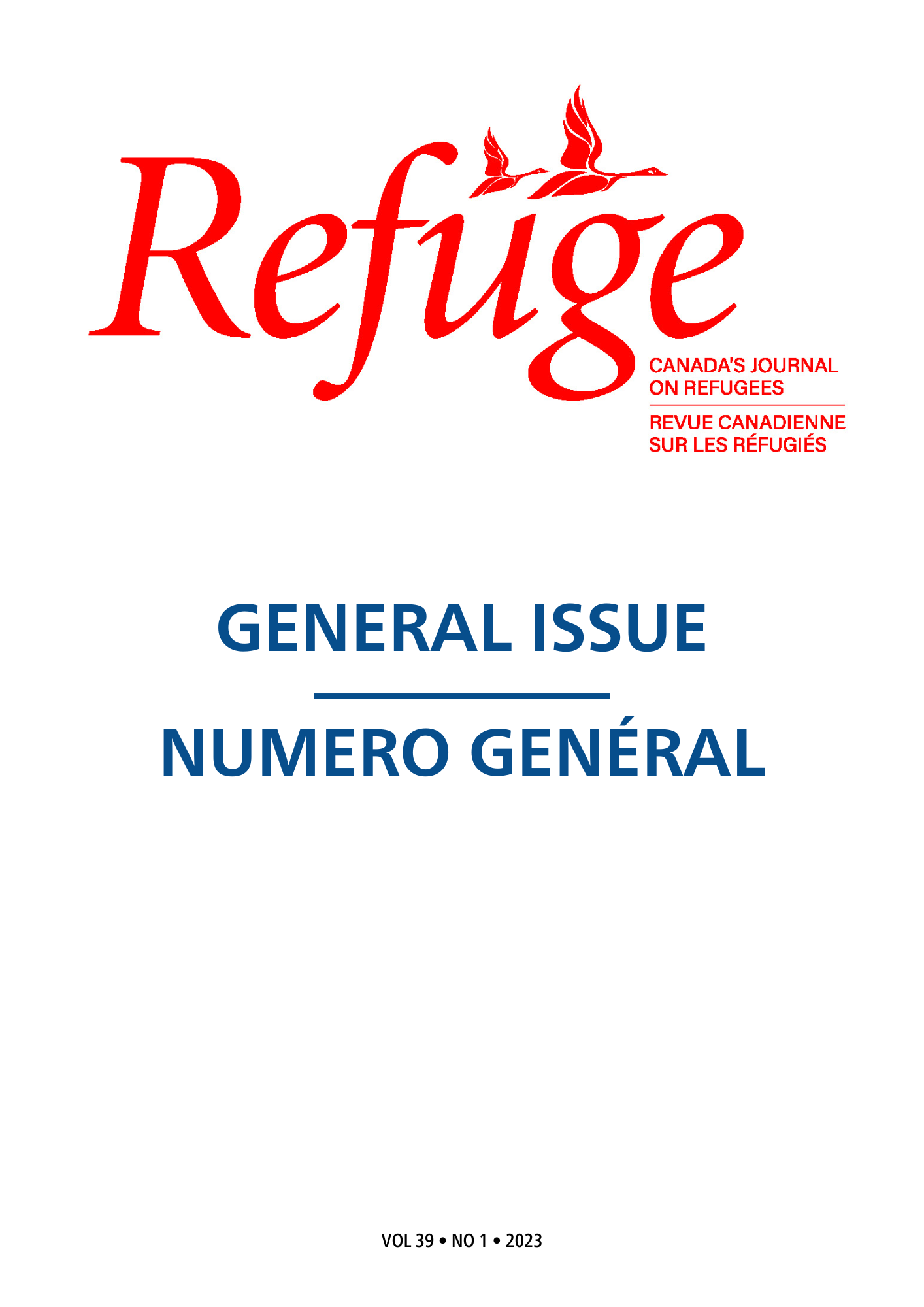More on the Origin of Refuge
DOI :
https://doi.org/10.25071/1920-7336.41171Mots-clés :
forced migration studies, refugees, Refuge: Canada's Journal on RefugeesRésumé
editorial
Statistiques
Références
Adelman, H. (2022). Celebrating 40 Years: The Origins of Refuge. Refuge: Canada’s Journal on Refugees, 38(1), 1–3. https://doi.org/10.25071/1920-7336.41018 DOI: https://doi.org/10.25071/1920-7336.41018
Adelman, H. (1982). Politics and Refugees: The United Nations Relief and Works Agency for Palestine Refugees in the Near East. Refuge: Canada’s Journal on Refugees, 1(8), 1–4. https://doi.org/10.25071/1920-7336.21421 DOI: https://doi.org/10.25071/1920-7336.21421
Arkell, V. (1981). The First Friendship Families. Refuge: Canada’s Journal on Refugees, 1(3), 4-4. https://doi.org/10.25071/1920-7336.21404 DOI: https://doi.org/10.25071/1920-7336.21404
Beddoes, D. (1979, June 27). A Rush of Aid to Refugees. The Globe and Mail
Chaleff, R. (1981). Friendship Families in Toronto. Refuge: Canada’s Journal on Refugees, 1(3), 5. https://doi.org/10.25071/1920-7336.21406 DOI: https://doi.org/10.25071/1920-7336.21406
Chomsky, N. (1968). Language and mind. Harcourt, Brace and World. DOI: https://doi.org/10.1037/e400082009-004
Durno, L. (1981). Une tragédie humaine. Refuge: Canada’s Journal on Refugees, 1(1), 2-3. https://doi.org/10.25071/1920-7336.21059 DOI: https://doi.org/10.25071/1920-7336.21059
C. Hathaway, J., & S. Schelew, M. (1981). La pérsecution par la proscroption économique: nouveau dilemme pour les réfugiés. Refuge: Canada’s Journal on Refugees, 1(5), 1–3. https://doi.org/10.25071/1920-7336.21075 DOI: https://doi.org/10.25071/1920-7336.21075
Hanson, K. (1982a). Baha’is. Refuge: Canada’s Journal on Refugees, 2(1), 1,3. https://doi.org/10.25071/1920-7336.21429 DOI: https://doi.org/10.25071/1920-7336.21416
Hanson, K. (1982b). The Refugees We Don’t Want to Keep: Some Background to the Case of Victor Regalado. Refuge: Canada’s Journal on Refugees, 1(7), 8–9. https://doi.org/10.25071/1920-7336.21420 DOI: https://doi.org/10.25071/1920-7336.21420
Hanson, K., & Inkelas, S. (Eds.) (2013). The Nature of the Word: Studies in Honor of Paul Kiparsky, MIT Press Scholarship Online. https://doi.org/10.7551/mitpress/9780262083799.001.0001 DOI: https://doi.org/10.7551/mitpress/9780262083799.001.0001
Johnson, M. (1981). Investing in a Million - Successfully. Refuge: Canada’s Journal on Refugees, 1(2), 1-2. https://doi.org/10.25071/1920-7336.21065 DOI: https://doi.org/10.25071/1920-7336.21065
Kharas, F. (1982). Measuring Gross National Refugee Product: A Framework for the Classification of Refugee Source Countries. Refuge: Canada’s Journal on Refugees, 1(8), 8–10. https://doi.org/10.25071/1920-7336.21423 DOI: https://doi.org/10.25071/1920-7336.21423
Kiparsky, P. (1987). On theory and interpretation. In C. MacCabe et al. (Eds.), The Linguistics of Writing. Methuen.
Paré, C. and Hoang, T. (1981). Sudbury Families Welcome Refugees into their Homes. Refuge: Canada’s Journal on Refugees, 1(3), 4. https://doi.org/10.25071/1920-7336.21405 DOI: https://doi.org/10.25071/1920-7336.21405
Scott Heron, G. (1994) Work for Peace. [Lyrics]. Retrieved from https://genius.com/Gil-scott-heron-work-for-peace-lyrics
Spiegel, P. B. (2000). Health Issues Affecting Displaced Populations: The Evolution of Public Health Response in Emergency and Post-Emergency Phases of Complex Emergencies. Refuge: Canada’s Journal on Refugees, 18(5), 1-3. https://doi.org/10.25071/1920-7336.22044 DOI: https://doi.org/10.25071/1920-7336.22044
Trudeau, P. E. (1981). Un mot du premier ministre. Refuge: Canada’s Journal on Refugees, 1(1), 2. https://doi.org/10.25071/1920-7336.21058 DOI: https://doi.org/10.25071/1920-7336.21058
Vuong-Riddick, T. (1992). To My Father. Canadian Woman Studies/Les Cahiers De La Femme, 12(3), 114. https://cws.journals.yorku.ca/index.php/cws/article/view/10522
Téléchargements
Publié-e
Comment citer
Numéro
Rubrique
Licence
© Kristin Hanson 2023

Cette œuvre est sous licence Creative Commons Attribution - Pas d'Utilisation Commerciale 4.0 International.
Les auteurs qui publient dans Refuge conservent le droit d’auteur associé à leur œuvre, et octroient au public une licence Creative Commons Attribution - Utilisation non commerciale 4.0 International. La licence permet l’utilisation, la reproduction et l’adaptation du matériel avec attribution par tous moyens et sous tous formats pour des fins non commerciales. Pour des informations générales sur les licences Creative Commons, visitez le site Creative Commons. Pour la licence CC BY-NC 4.0, consultez le résumé lisible par l'homme.







